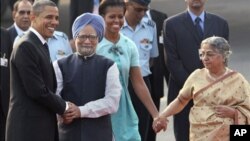On the final day of his three-day stay in India, President Barack Obama will hold formal bilateral discussions with Prime Minister Manmohan Singh and address a joint session of India's parliament. Indian media have been full of discussion about Mr. Obama's remarks about Pakistan during a Town Hall-style meeting with students in Mumbai.
Causing the most discussion in Indian media was a question asked of U.S. President Barack Obama by a young woman student Sunday at St. Xavier College in Mumbai.
"Why is Pakistan so important an ally to America [that] America has never called it a terrorist state?," asked one student.
Mr. Obama's response was his first public mention of Pakistan since his arrival in India, and this quickly became a subject of debate on Indian television news channels.
A key criticism was that Mr. Obama should have mentioned the Pakistani connection with the 2008 terrorist attacks in Mumbai, carried out by Pakistani-trained militants, when he spoke at the Taj Hotel, one of the targets of the terrorists to honor the victims.
White House officials responded by saying the president knew he would have opportunities to talk about Pakistan, which is just what happened in Mumbai.
The president's response broke no new ground. Pakistan, he said, is a strategically important country that now understands the threat from extremists within its borders. "Our feeling has been to be honest and forthright with Pakistan to say we are your friend, this is a problem and we will help you, but the problem has to be addressed," he said.
The president also made a point of mentioning India-Pakistan relations, saying India has a big stake in a stable Pakistan. "I am absolutely convinced that the country that has the biggest stake in Pakistan's success is India. I think that if Pakistan is unstable, that is bad for India. If Pakistan is stable and prosperous, that is good," he said.
President Obama also repeated his administration's position that the United States cannot mediate in India-Pakistan talks and will not impose a settlement of bilateral tensions.
Speaking in Washington recently, former Undersecretary of State for Political Affairs Nicholas Burns spoke about the challenge for the U.S. in helping this process along. "The real challenge for us is can the U.S. on the margins, because we will not be central to this, can we assist the composite dialogue between India and Pakistan? Between the foreign secretaries of those two countries as they try to reduce these differences. And again, neither country would want us to be a mediator, but I think both countries might appreciate U.S. interest in seeing some of these problems resolved," he said.
Indian concerns about its nuclear-armed neighbor, which include worries about $2 billion in new U.S. military aid to Pakistan announced in recent weeks, are likely to come up when President Obama and Prime Minister Singh hold two sets of bilateral talks Monday.
They are likely to be questioned by reporters in a joint news conference about Pakistan, policy on Afghanistan and other issues, including difficulties in finally implementing the U.S.-India civil nuclear accord.
President Obama's address to a joint session of India's parliament Monday is likely to stress the U.S. view of India as an already risen power and a strong strategic and counter-terrorism partner.
It will also underscore the main focus of the president's visit, an expanding economic and business relationship that Mr. Obama has said will help support and create jobs back in the United States.
The Obamas attend a state dinner in the evening, the culmination of a visit that has been the longest to a foreign country during Mr. Obama's presidency.
Obama, Indian Prime Minister to Hold Formal Bilateral Talks
- By Dan Robinson





